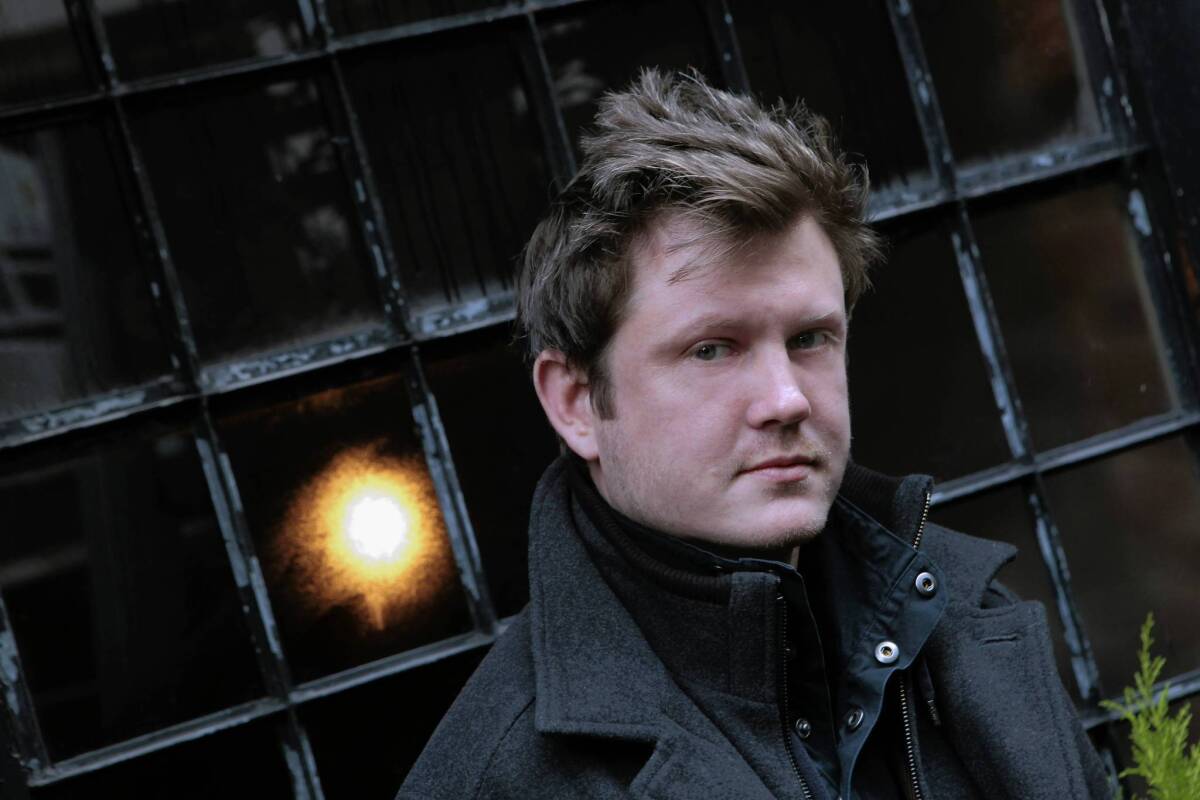Beau Willimon’s political work is foundation for ‘House of Cards’

NEW YORK — As an undergraduate art major at Columbia University, Beau Willimon, the Oscar-nominated screenwriter of “The Ides of March” and creator of the much-hyped new Netflix series “House of Cards,” never would have guessed he’d build a career writing about politics.
“I was one of those guys that had paint all splattered over my jeans,” says the 35-year-old between hearty gulps of coffee at the Smile, a fashionably rustic restaurant in NoHo.
FOR THE RECORD:
“House of Cards”: In the Feb. 12 Calendar section, an article about “House of Cards” creator Beau Willimon misspelled the first name of Kevin Spacey’s character in the Netflix series, Francis Underwood, as Frances. —
For days, conversation about “House of Cards” has focused on its unprecedented, simultaneous 13 episode rollout and What It All Means for Content Providers.
PHOTOS: Celebrities by The Times
But if Willimon is a touch jittery, it’s from the caffeine, not the considerable pressure of helming a much-scrutinized, $100-million programming experiment.
It helps that Willimon is confident Netflix’s hands-off approach to development — the Internet streaming service committed to 26 episodes having seen only a pilot script — will pay off.
“By saying we’ll place our faith in the artists, there’s just as much a chance it will succeed as if you’re constantly interfering,” he says. “Certainly it will draw talent. People can go play in a sandbox and not be told how they’re supposed to build their castle.”
Adapted from a widely acclaimed 1990 BBC series, “House of Cards” stars Kevin Spacey as Frances Underwood, the House of Representatives majority whip with a thick-as-kudzu Southern accent and an equally pronounced taste for vengeance. David Fincher directed the first two episodes and serves as executive producer. Robin Wright plays Underwood’s quietly scheming wife who’s in charge of an environmental nonprofit and Kate Mara is an ambitious young political reporter.
“I understood when Daniel Day-Lewis said [at the Golden Globes], being able to say the words that Tony Kushner wrote makes him aware of every day how bereft he is of words, and I feel very much the same way with someone like Beau,” Spacey says.
“House of Cards” arrives not just at a fertile time for television but specifically for shows that take a jaundiced look at politics — among others, CBS’ “The Good Wife,” Showtime’s “Homeland,” FX’s “The Americans,” HBO’s “Veep,” ABC’s “Scandal.”
Following in the footsteps of “Luck” and “Boardwalk Empire,” it’s also the latest series to attract A-list film talent to the small (in this case, really small) screen. Unlike those and other TV shows, however, there will be no ratings data made public— the video streaming service with an estimated 27 million subscribers won’t release information about viewership.
“If you combine my TV experience with David Fincher’s TV experience with just about everybody else’s TV experience, it amounts to close to zero,” Willimon notes with a laugh.
PHOTOS: Hollywood backlot moments
Although television-that-isn’t-actually-on-television is uncharted territory for Willimon, politics certainly aren’t, thanks to stints on the campaign trail for Bill Bradley, Hillary Rodham Clinton and Howard Dean, and an 18-year friendship with Jay Carson, a top Democratic operative.
Carson, the summer before their senior year at Columbia, enlisted Willimon to join the senatorial campaign of Charles E. Schumer, then a little-known Brooklyn congressman. Initially running a distant third place in the primaries (early polls had him at 3%), Schumer went on to defeat incumbent Al D’Amato in 1998 by a double-digit margin.
“It was a really great experience, in fact no campaign I’ve worked on since has matched it,” Willimon says.
That same year, largely on a whim, he also entered a playwriting competition at Columbia. Much to his surprise, he won. Willimon has since destroyed all traces of the “terrible” prize-winning play (about “a goat shepherd, Muhammad Ali and a trip to Mars”) but it provided a confidence-boost.
After a bit of post-graduate rambling — including a long, sleepless summer poring over European Union asylum laws for the Estonian government — Willimon wound up back in the master’s playwriting program at Columbia. He spent the next few years “screaming in the wilderness, writing in complete obscurity,” detailing cars and serving espresso to make ends meet. Occasionally, he’d take a few months off to join Carson, a quickly rising political wunderkind, on the campaign trail.
“It is a form of escape. You get to leave everything behind and focus on this very quantifiable goal. You either win or you lose,” he says. “Writing is the opposite of that.”
In 2004, Willimon relocated to Iowa for four months to join Howard Dean’s insurgent presidential campaign. He worked in press advance, schlepping jaded political reporters across the frozen cornfields in crowded vans, where he was often privy to their unguarded opinions on the race.
Like many other “Deaniacs,” Willimon was heartbroken by the candidate’s precipitous flameout in the Democratic primary. “I think we were all really young and as a result fairly naive on that campaign and we really believed in what we were doing. Losing was really crushing,” Carson says.
He channeled his frustrations into “Farragut North,” a play about an idealistic young campaign staffer who realizes the boss he reveres isn’t quite the man he seems to be. (The title, suggested by Carson, is borrowed from the D.C. metro stop associated with lobbyists.)
When 40 theater companies turned down the project, Willimon shelved it until 2008, when he sent it out as a writing sample to Hollywood agents in hopes of getting a few meetings.
What he got instead was a call saying Warner Bros. would like to option the play — which at that point had never even been staged — with Leonardo DiCaprio and George Clooney to produce. The play eventually ran at the Atlantic Theater Company in New York in October and November 2008 — a moment that, for liberals, seemed a world away from the bitter disappointment of 2004.
“What was a little bizarre about that was the play takes a darker look at politics, and at that time, at least for slightly more than half the country, there was resounding idealism and hope and enthusiasm,” he says. “On election night, we were announcing the returns at intermission and at the end of the show.”
Willimon is producing two documentaries that are as outside-the-beltway as it gets: “Westerly,” about transgender surfer Peter Drouyn; and “Odyssey,” about a British man’s quest to circumnavigate the globe on foot.
“I like to live in a lot of worlds at once,” says Willimon, who resumes production on “House of Cards” in the spring.
Carson, a consultant on the series, hesitates to call his friend a “political junkie,” but he does believe Willimon has unique insight into the democratic process.
“With most other writers you would spend a lot of time educating them about the reality of politics, but Beau worked on three campaigns with me. My version of it is writing a cop show after you’ve done a couple of ride-alongs with the police,” he says. “Beau was a cop.”
PHOTOS, VIDEOS & MORE:
GRAPHIC: Faces to watch in 2013
VIDEO: Winter TV preview
PHOTOS: Best TV of 2012
More to Read
The complete guide to home viewing
Get Screen Gab for everything about the TV shows and streaming movies everyone’s talking about.
You may occasionally receive promotional content from the Los Angeles Times.






